Best of #econtwitter - Week of July 25, 2021
Jul 26, 2021
Welcome readers old and new to this week’s edition of Best of Econtwitter. Thanks to those sharing suggestions, over email or on Twitter @just_economics.
Paper summary threads

John B. Holbein@JohnHolbein1
High speed internet increases poorer households' income.
AEJ:Policy: aeaweb.org/articles?id=10…
Ungated: github.com/georgewzuo/geo…

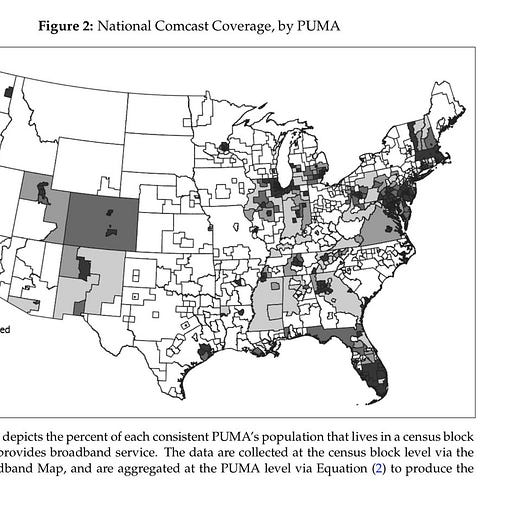

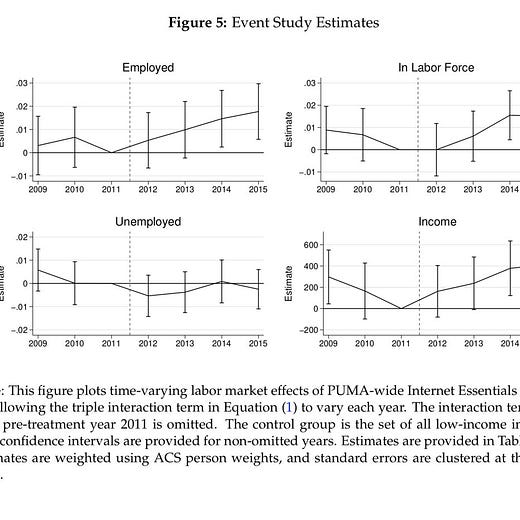
2:45 PM · Jul 23, 2021
77 Reposts · 219 Likes

Brad Shapiro@btshapir
Really proud of this paper. I think the paper has a lot to say about the observed state of the world when it comes to overall TV advertising effectiveness and profitability.
I want to be clear about what the paper doesn't say.
1/

econometrica @ecmaEditors
New estimates of TV advertising effectiveness across 288 CPG brands show that advertising generally has little effect on sales and most brands earn a negative ROI. The results cast doubt on the sustainability of financing TV content markets with ad revenue https://t.co/jl9651Njs9 https://t.co/nxD8lbFEDT
12:12 AM · Jul 20, 2021
57 Reposts · 316 Likes
^but “If this is right, why are there all these TV ads?”: Athey; another author

Lukas Freund@_LukasFreund_
Interesting new @nberpubs WP by Impink, @andreapratnyc & @raffasadun.
🔢Firm-level communication measures derived from email + meeting metadata.
1⃣ CEO turnover leads to initial ⬇️in intra-firm comm., followed by a ⬆️~5m thereafter.
2⃣ ⬆️driven primarily by vertical comm.
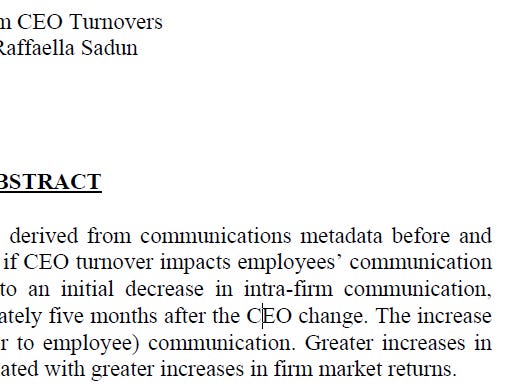
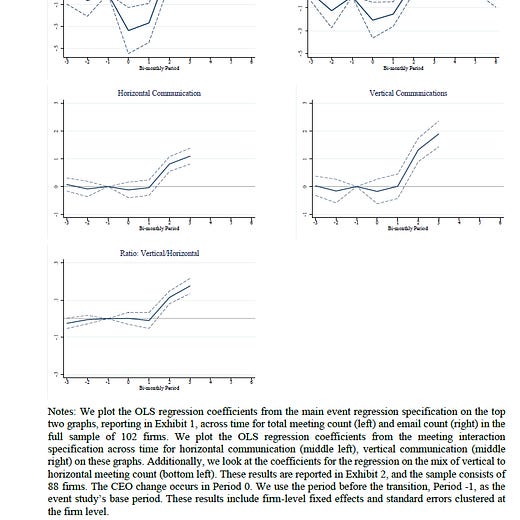
7:58 AM · Jul 19, 2021
4 Reposts · 14 Likes

Dan Zeltzer@danzeltzer
We find that when residents of a zip code are first served by an urgent care center, total Medicare spending rises while mortality remains flat. Hospital spending increases the most. 5/

7:04 PM · Jul 19, 2021
1 Like

Maggie Shi@maggieshi311
Hello, #EconTwitter! Excited to share [my first!] Working Paper Thread!🧵👇
In this paper, @talgross, @asacarny, David Silver, and I ask: how do hospitals respond to increases in payment rates?
We find: they increase admissions, reduce length of stay, and increase scale.
1/6

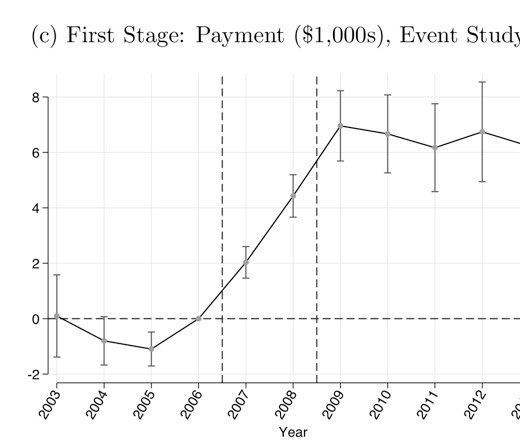
11:36 AM · Jul 19, 2021
11 Reposts · 105 Likes

Robert Dur@DurRobert
People are most likely to switch away from news programs during soft news stories, and least likely during sensational news.
Evidence from minute-by-minute viewership data from 🇮🇹: nber.org/papers/w29020 by Marco Gambaro, @vlarcinese, @ricpuglisi, and James M. Snyder Jr.
2/2


10:53 AM · Jul 19, 2021
8 Reposts · 11 Likes
^one of the authors comments

Tommaso Porzio@PorzioTommaso
To design social insurance, it is useful to know which households have a higher valuation of liquidity: who values an extra 💵 more?
In work in progress, we offer a creative approach to measure it. How?
See it at #NBERSI HF & AG (bit.ly/3wUFzrJ) or read 🧵 👇
1/
bit.ly
SI 2021 Household Finance

4:19 PM · Jul 22, 2021
20 Reposts · 93 Likes

Journal of Public Economics@JPubEcon
Who pays for the minimum wage?
In administrative tax data from Israel, lower-income business owners and those with higher shares of minimum wage workers pay the largest shares.
Since these are not the highest-income owners, redistributive effects are limited.

1:54 PM · Jul 19, 2021
7 Reposts · 12 Likes

Tal Gross@talgross
Here's one way to see the key result of the paper: a binned scatterplot. The vertical axis plots hospitals' change in Medicare visits before and after the policy change; the horizontal axis plots hospitals' change in reimbursement.

10:39 AM · Jul 19, 2021
^another thread from a coauthor

Carolina Garriga@Caro_Garriga
Shameless self-promotion: @JPR_journal accepted my article “Central Banks and Civil War Termination”
[paper ➡️papers.ssrn.com/sol3/papers.cf…]
Here's what I found, in 6 tweets:
1/6
papers.ssrn.com
Central Banks and Civil War Termination by Ana Carolina Garriga :: SSRN

2:22 PM · Jul 21, 2021
30 Reposts · 164 Likes

C. Kirabo Jackson@KiraboJackson
Revised meta-analysis of school spending effects with
@c_mackevicius. Consistent pos relationship between spending and better outcomes in credibly causal studies. Robust to many modeling decisions, "fixes" for publication bias, and even confounding.
nber.org/papers/w28517
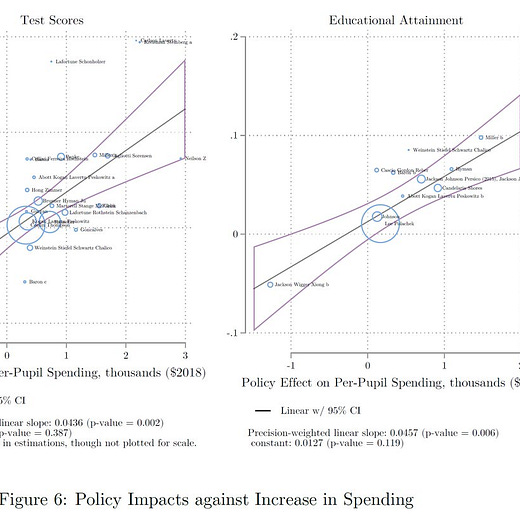
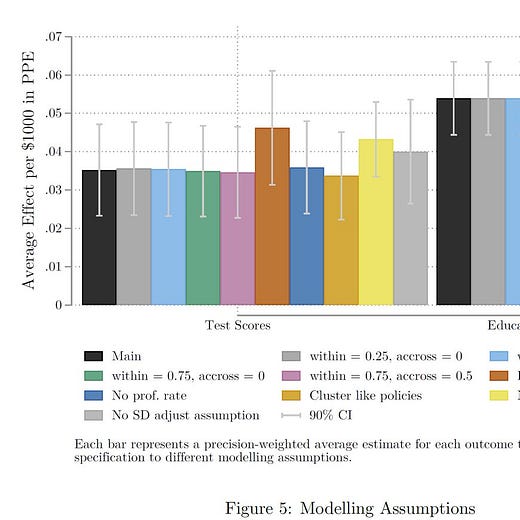

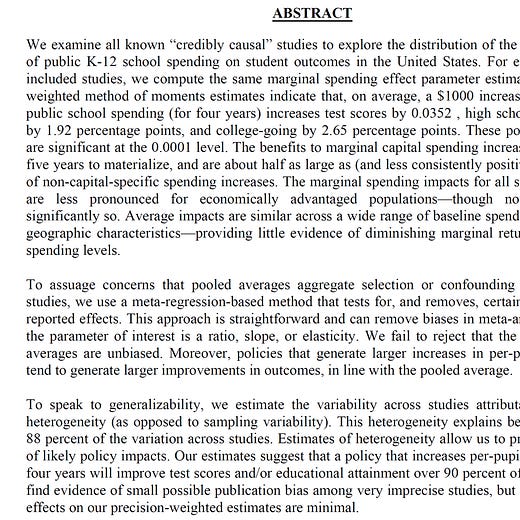
3:45 PM · Jul 23, 2021
50 Reposts · 119 Likes
More: public housing and academic outcomes; racial inequality in mortgage markets; fluoride in water natural experiment; Roman infrastructure persistence; US medical debt stylized facts; theory and empirics; inheritance rights for women and child health
Public goods

Arpit Gupta@arpitrage
If you're going on the market this fall with a real estate JMP (or something else you think might be relevant to my research) — reach out and we can schedule a quick Zoom call to discuss.
Can't promise to read paper in depth, but happy to chat.
2:57 PM · Jul 20, 2021
43 Reposts · 194 Likes

Arpit Gupta@arpitrage
Here are some other people who have made similar offers. Add your name below as well if you're willing to volunteer.
Finance/IO/Market Design:

Anthony Lee Zhang @AnthonyLeeZhang
If you're going on the market this fall with a, uh, finance-IO paper, or finance market design, or anything else you think I might be helpful with, feel free to email or DM me. Happy to look at paper/slides and give some feedback!
11:07 PM · Jul 20, 2021
7 Likes
^long thread of extreme generosity
Interesting discussions

Ben Golub@ben_golub
Hidden curriculum observation: audiences are eager to classify "new" ideas as essentially understood or unimportant to conserve their scarce attention. Can seem unfair/ungenerous, and in a way it is! But anyway hit them on the head with why it's new and important.
7:23 PM · Jul 19, 2021
29 Reposts · 226 Likes

scott lasso@causalinf
This was my keynote on the hidden curriculum. I focused on mental health and success. I thought it came together. dropbox.com/s/mcvazhmel97h…

3:36 PM · Jul 19, 2021
77 Reposts · 388 Likes
^see also: “Tips for new professors (& students)”

Andrea Matranga@andreamatranga
I did a couple of mock interviews for people applying to RA/Economicky type stuff, and just a couple of observations:
9:22 PM · Jul 22, 2021
12 Reposts · 40 Likes

Ricardo Perez-Truglia@pereztruglia
(1/11)
Thread about the publication process in Economics. It is inefficient. It probably made sense pre-Internet, but it is clearly antiquated by now.
It may not be the best solution, but I have a proposal. And I'm curious to hear other proposals from #EconTwitter
12:33 AM · Jul 26, 2021
52 Reposts · 213 Likes

Robert Metcalfe@RDMetcalfe
Currently writing a few papers with clear null effects with mechanisms, so I'm interested in how previous authors have framed nulls.
What is everyone's favorite paper where the null is the main result and is contrary to people's priors?
4:51 PM · Jul 23, 2021
10 Reposts · 44 Likes

Andrey Fradkin@AndreyFradkin
A bit of navel gazing ahead. I've decided to retire a paper that comprised much of my doctoral thesis from 2014. The paper simulates the search and matching process on Airbnb and shows the simulation is useful. Some thoughts on retiring the paper andreyfradkin.com/assets/simulat… 1/
andreyfradkin.com
6:55 PM · Jul 19, 2021
8 Reposts · 92 Likes

